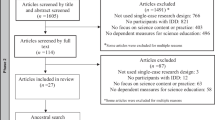Abstract
Science content remains a commonly overlooked academic content area for students with severe disabilities, including ASD and ID, despite recent research. The purpose of this study was to evaluate the effects of systematic instruction, such as prompting and fading techniques, implemented during whole-group science instruction for students with both ASD and ID. Three elementary-aged students with both ASD and ID were taught science content using systematic instruction provided during group lessons; effects were measured using a multiple baseline design across behaviors (i.e., science units) with concurrent replication across participants. Science content was taught to all three participants in group lessons using systematic instruction utilizing errorless prompting methods (i.e., constant time delay) and activities that are related to the unit content. Probes were used to determine baseline and intervention effects. The results demonstrated a functional relation for one participant with increased performing demonstrated for the remaining two participants, indicating that use of systematic instruction embedded within a group instructional format may be effective when teaching science content.



Similar content being viewed by others
References
Browder, D. M., & Cooper-Duffy, K. (2003). Evidence-based practices for students with severe disabilities and the requirement for accountability in “No Child Left Behind”. The Journal of Special Education, 37, 157–163.
Browder, D. M., & Spooner, F. (2014). More language arts, math, and science for students with severe disabilities. Baltimore, MD: Brookes Publishing.
Collins, B. C. (2012). Systematic instruction for students with moderate and severe disabilities. Baltimore, MD: Brookes Publishing.
Cooper, J. O., Heron, T. E., & Heward, W. L. (2007). Applied behavior analysis (2nd ed.). Upper Saddle River, NJ: Pearson Education Inc.
Courtade, G. R., Spooner, F., & Browder, D. M. (2007). Review of studies with students with significant cognitive disabilities which link to science standards. Research & Practice for Persons with Severe Disabilities, 32, 43–49. https://doi.org/10.2511/rpsd.32.1.43.
Drasgow, E., Wolery, M., Chezan, L. C., Halle, J., & Hajiaghamohseni, Z. (2017). Systematic instruction of students with significant cognitive disabilities. In J. M. Kauffman, D. P. Hallahan, & P. Cullen Pullen (Eds.), Handbook of special education (2nd ed., pp. 516–531). New York, NY: Routledge.
Every Student Succeeds Act, Pub. L. No. 114-95, § 1177 Stat. (2015).
Gast, D. L., Wolery, M., Morris, L. L., Doyle, P. M., & Meyer, S. (1990). Teaching sight word reading in a group instructional arrangement using constant time delay. Exceptionality, 1, 81–96.
Jimenez, B. A., Browder, D. M., & Courtade, G. R. (2010). An exploratory study of self-directed science concept learning by students with moderate intellectual disabilities. Research and Practice for Persons with Severe Disabilities, 34, 33–46. https://doi.org/10.2511/rpsd.34.2.33.
Johnston, J. M., & Pennypacker, H. S. (2009). Creating experimental designs. In Strategies and tactics of behavioral research (3rd ed., pp. 259–292). New York, NY: Routledge.
Kennedy, C. H. (2005). Single-case designs for educational research. Boston: Allyn and Bacon.
Knight, V. F., Spooner, F., Browder, D. M., Smith, B. R., & Wood, C. L. (2013). Using systematic instruction and graphic organizers to teach science concepts to students with autism spectrum disorders and intellectual disability. Focus on Autism and Other Developmental Disabilities, 28, 115–126. https://doi.org/10.1177/1088357612475301.
National Research Council. (1996). National science education standards. Washington, DC: National Academy Press.
O’Neill, R. E., McDonnell, J. J., Billingsley, F. F., & Jenson, W. R. (2011). Single case research designs in educational and community settings. Boston: Pearson.
Smith, B. R., Spooner, F., Jimenez, B. A., & Browder, D. M. (2013). Using an early science curriculum to teach science vocabulary and concepts to students with severe disabilities. Education and Treatment of Children, 36, 1–31. https://doi.org/10.1353/etc.2013.0002.
Spooner, F., Knight, V., Browder, D. M., Jimenez, B., & DiBiase, W. (2011). Evaluating evidence-based practice in teaching science content to students with severe developmental disabilities. Research & Practice for Persons with Severe Disabilities, 36, 62–75. https://doi.org/10.2511/rpsd.36.1-2.62.
Spooner, F., Knight, V., Browder, D. M., & Smith, B. R. (2012). Evidence-based practice for teaching academics to students with severe developmental disabilities. Remedial and Special Education, 33, 374–387. https://doi.org/10.1177/0741932511421634.
Spooner, F., McKissick, B. R., & Knight, V. F. (2017). Establishing the state of affairs for evidence-based practices in students with severe disabilities. Research and Practice for Persons with Severe Disabilities, 42(1), 8–18. https://doi.org/10.1177/1540796916684896.
Funding
This study was not funded by a grant.
Author information
Authors and Affiliations
Corresponding author
Ethics declarations
Conflict of interest
The authors declare that they have no conflict of interests.
Ethical Approval
All procedures performed in studies involving human participants were in accordance with the ethical standards of the institutional and/or national research committee and with the 1964 Helsinki Declaration and its later amendments or comparable ethical standards.
Informed Consent
Informed consent was obtained from all participants included in the study.
Additional information
Publisher's Note
Springer Nature remains neutral with regard to jurisdictional claims in published maps and institutional affiliations.
Rights and permissions
About this article
Cite this article
Greene, A., Bethune, K.S. The Effects of Systematic Instruction in a Group Format to Teach Science to Students with Autism and Intellectual Disability. J Behav Educ 30, 62–79 (2021). https://doi.org/10.1007/s10864-019-09353-6
Published:
Issue Date:
DOI: https://doi.org/10.1007/s10864-019-09353-6




